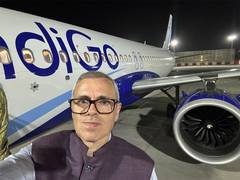Serpentine queues in South Kashmir for voting; kin of terrorists also cast ballot
Shopian/Kulgam (Kashmir), May 25 (PTI) In a remarkable display of resilience and commitment to democracy, the residents of villages that had long been deprived of polling due to terrorist threats and separatist-sponsored boycott calls turned out in large numbers to cast ballots in the sixth phase of Lok Sabha polls on Saturday.
Braving scorching sun, people stood in serpentine queues and patiently waited to participate in the electoral process — first major battle since the abrogation of Article 370 and the division of Jammu and Kashmir into two Union Territories in August 2019.
A segment of Shopian is part of the redrawn Anantnag-Rajouri parliamentary constituency which went to polls in the sixth phase on Saturday.
Moderate to brisk polling was observed after the start of the voting across the constituency at 7 am.
One particularly striking moment was when the family members of active terrorists were spotted at polling booths exercising their right to vote.
Mushtaq Ahmed Reshi, the father of Hizbul Mujahideen terrorist Junaid Reshi, was seen at a polling booth in Shopian’s Beminapura casting his ballot.
He was full of enthusiasm as he talked to reporters, expressing his belief in the power of democracy and the idea of India, emphasising his determination to participate in the democratic process.
Following closely behind was former separatist Mukhtar Waza, who also cast his vote, marking a significant shift in attitudes within the community.
The turnout in these villages not only defied the looming threat of terrorism but also showcased a strong commitment among people to upholding the principles of democracy. As residents lined up to make their voices heard, the atmosphere was full of a sense of empowerment and hope for a better future.
The enthusiasm among the voters was such that people with disabilities also made it to the polling stations to cast their ballot instead of availing the facility of home voting.
“Voting is our democratic right and we are eagerly participating in the polling process with a hope that our representative will highlight our problems and seek their resolution,” Abdul Ahad (72) told PTI at a polling station in Nadimarg.
He alleged that the villagers are suffering because of lack of basic facilities like electricity, water and proper roads.
“The talk of development is only on papers and not on the ground. The government should focus on the village with poor population,” he said.
Mohammad Sultan, a senior citizen, drew much attention as he came to a polling station riding a horse.
“I am suffering from an ailment and unable to walk freely…By voting, I have fulfilled my responsibility and now it is the term of our representative to take care of our needs which include proper structure of school, improved roads, round-the-clock water and electric supply besides proper healthcare,” he said.
He said most residents are labourers by profession and could not pay hefty electricity bills.
“We used to get bills in the range of Rs 150 to Rs 200 but now the cost of the energy is between Rs 1,000 and Rs 1,500. It is very difficult for us to pay power bill. If we pay the bills, how could we feed our families?” he said.
The voting in banned Jamaat-e-Islami-dominated areas was also high and one of the senior officials said the courage and determination displayed by the voters in the face of adversity serve as a powerful reminder of the enduring spirit of democracy and the unyielding resolve of individuals to shape their own destiny.






